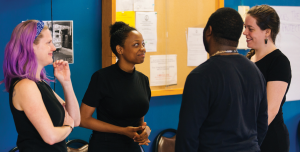
LENORE BAJARE-DUKES AND SAMANTHA LAWLER, then-MA candidates, spent their spring 2017 semester practicum with Richmond-based social justice theater company The Conciliation Project. For both women, the experience of learning about truth-telling practices with an accomplished troupe of actors and practitioners was deeply moving.
Bajare-Dukes also contextualized her learnings by aiding in a mapping project of truth-telling, memorialization and reparations organizations around the country (fellow graduate student Jennifer Chi Lee also contributed). Jodie Geddes MA ’16, a community organizer with Restorative Justice for Oakland Youth (RJOY), supervised the research, with help from other graduate students from University of California, Berkeley, and University of Notre Dame. The work was jointly supported by RJOY and CJP, with funding provided by the Telemachus Foundation.
The mapping project aims to generate synergy, cross-pollination, momentum and movement-building through the connection of many local and regional efforts. “We want to document these community-based participatory initiatives and bring them together into a network, ultimately to host a national convening or create a center that would act as a resource and hub for the multiple local processes going on around the nation,” said Fania Davis, executive director of RJOY, while presenting on the topic to a Summer Peacebuilding Institute class.
One focus of the mapping is to foster and honor the collective wisdom already working on this challenging process within specific local contexts. “There’s a lot of wisdom in communities to say what does truth and reconciliation look like? What does racial healing look like?” Geddes said. “We are looking at what communities are doing, what they name as their needs, and how we can begin to support them?”
Both women urged that the hard work of naming historical and institutionalized violence against African Americans needs to begin now. [Their presentation occurred before the events of Charlottesville in August 2017.]
“There is an African proverb that says a finger pointing also has three fingers pointing back at you,” Geddes says. “We live in a post-genocidal and post-slavery land and we have done nothing in all of these centuries to repair that harm. We insist that other countries do that work. A process that is done well names the power and privilege and violence that exists and has existed. We need to name the violence that perpetuates against the people of this nation.”
Stay tuned for more coverage of this project and CJP’s involvement with the W.K. Kellogg Foundation Truth, Racial Healing and Transformation enterprise on the CJP website.